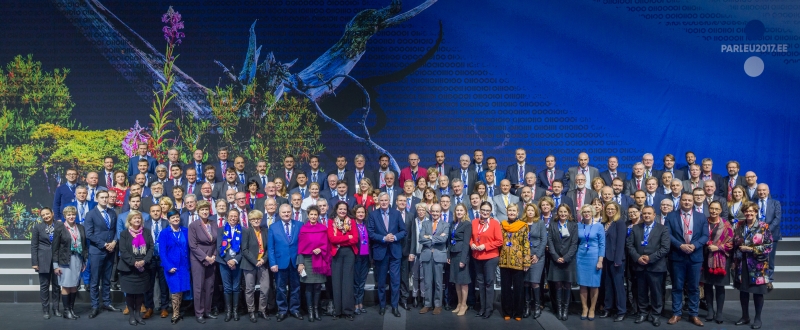Chairperson of the Committee on European Integration Mr Adrijan Vuksanović and member of the Committee Mr Mihailo Anđušić participated in the LVIII Plenary Meeting of the Conference of Parliamentary Committees for Union Affairs of Parliaments of the European Union (COSAC), which took place in Tallinn, within the parliamentary dimension of the Estonian Presidency of the EU.
The Meeting was opened by Mr Eiki Nestor, President of the Parliament of Estonia (Riigikogu), who spoke of the significance of strengthening the unity and openness of the European Union, in the context of challenges brought about by the Brexit negotiations and the increasing xenophobia and populism. Furthermore, Mr Nestor pointed out the role of digital technologies in strengthening openness, effectiveness, and accountability of institutions.
Within the first session on the future of the European Union, the speakers were: Ms Kersti Kaljulaid, President of the Republic of Estonia; Mr Michel Barnier, EU Chief Negotiator for Brexit; Ms Danuta Maria Hübner, Chairperson of the Committee on Constitutional Affairs of the European Parliament while the moderator was Mr Toomas Vitsut, Chairperson of the European Union Affairs Committee of the Riigikogu. On the topic of Brexit, the core task was the arranged and agreed upon exit of the United Kingdom from the EU, with the resolving of the Northern Ireland status, the EU budget and the status of workers originating from the Union.
The European parliamentarians were also addressed by Chairperson of the Committee on European Integration Mr Adrijan Vuksanović, who presented Montenegro’s progress in negotiations and added that our country could be ready to join the EU even before 2025. Mr Vuksanović emphasised that the enlargement policy could give a new impetus to and a motivation for a stronger future of the EU.
Within this topic, several European parliamentarians, including representatives from Germany, Hungary, Romania and Bulgaria, discussed the future of the EU from the aspect of the enlargement policy and voiced their clear support to continuing negotiations with the candidate countries.
The Meeting was continued with the debate on the best practices of the national parliaments in bringing the European Union closer to its citizens, within which the speakers were: Ms Katrin Auel, Associate Professor in the Research Group European Integration, Vienna Institute for Advanced Studies; Mr Pieter Omtzigt, Member of the European Affairs Committee, House of Representatives of the Netherlands; Mr Kristian Vigenin, Chairperson of the Committee on European Affairs and Oversight of the European Funds, National Assembly of Bulgaria, while the moderator was Ms Monika Haukanõmm, Member of the European Union Affairs Committee of the Riigikogu. Within this session, the speakers presented various models of communication of parliaments with the citizens, and pointed out the need for strengthening transparency of European institutions, as a basic prerequisite of good quality of parliamentary oversight. On behalf of the Netherlands, MP Omtzigt presented a proposal for the letter which should be addressed to the European institutions, containing concrete measures for improving transparency and accountability.
The Committee member Mr Mihailo Anđušić addressed the European parliamentarians and presented the activities undertaken by the Committee aimed at bringing the EU closer to its citizens, such as public debates, debates with secondary school students, and meetings with representatives of the local self-governments. He also pointed out the significance of promoting concrete benefits for the citizens brought by the EU, such as the freedom of movement for citizens, better quality of products, cheaper communication, and protected environment.
On the topic of the Digital Single Market and e-services, the keynote speakers were Mr Siim Sikkut, Deputy Secretary General for Communications and State
Information Systems, Estonian Ministry of Economic Affairs and Communications; Mr Gunther Krichbaum, most recent Chairperson of the Committee on the Affairs of the European Union, German Bundestag, and Mr Jean Bizet, President of the European Affairs Committee, French Senat, while the moderator was Mr Kalle Palling, Member of the European Union Affairs Committee of the Riigikogu. During the session, they pointed out that the core of digitalisation of the public sector was not only about providing online services, but the overall simplification of procedures for the citizens, from establishing a company and paying taxes to voting in the elections. The MPs also discussed the security aspects of e-government, and pointed out the need for creating a European Digital Strategy.












